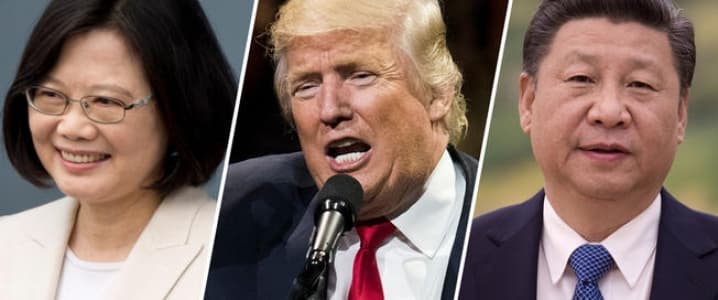As Washington and Beijing try to reach a deal after months of disagreement and trade tensions that have impacted not only both countries but the global economy as well as global oil demand growth and oil prices, new developments broke this weekend that will likely create more headwinds between the two countries. On Sunday, two American ships sailed through the growingly controversial Taiwan Strait.
U.S. Navy destroyer, the USS Curtis Wilbur, and U.S. Coast Guard cutter, USCGC Bertholf, "conducted a routine Taiwan Strait transit March 24-25 (local time) in accordance with international law," the Navy's Seventh Fleet said in a statement. "The ships' transit through the Taiwan Strait demonstrates the U.S. commitment to a free and open Indo-Pacific," U.S. Navy Commander Clay Doss, a spokesman for the Navy's Seventh Fleet. said in a statement.
Trump’s pro-Taiwan pivot
Unlike the Obama Administration, President Trump has reinforced U.S.-Taiwan relations even as Beijing continues to put more pressure against the self-ruled island that China considers its sovereign territory, while it still has never ruled out force in order to bring the country under its rule. President Trump, for his part, approved $330 millionn in arms sales to Taiwan in September, which provoked a stern rebuke from Beijing. However, that amount is the lowest in recent years, as U.S. policymakers weigh their obligation to help defend Taiwan against provoking Beijing in a delicate cat and mouse game that has been ongoing for years. Taiwan, for its part, particularly under current Taiwanese president Tsai lng-wen, has sought to solidify Taiwanese self-rule even. This weekend’s U.S. voyage marks the third such trip this year in the Taiwan Strait. Related: World’s 2nd Largest Oil Company Sees Huge Drop In Profit
Taiwan's President Tsai Ing-wen told CNN last month that the Chinese military threat posed by Beijing was growing "every day" in line with a more assertive foreign policy under its President Xi Jinping. Before her election, relations between China and Taiwan had reached a new era of conciliation or, as Beijing would like to call it, reconciliation during the administration of President MaYing-jeou, a Beijing-leaning bureaucratic that seemed prepared to allow the merging of the two sides through economic cooperation. Now that Tsai has been in office around three years, cross-strait relations can arguably be called the worst since 1979 when China stopped firing artillery barrages across the strait at Taiwanese outlaying islands.
Threat to Taiwan’s energy imports
As of Monday morning Beijing time, the Chinese government had yet to officially respond to the U.S. naval voyage. However, when it does reply, it will likely condemn the U.S. action, while also stating (again) that Taiwan is sovereign Chinese territory and the U.S. should avoid meddling in Chinese domestic affairs. Politics notwithstanding, there are also concerns in both Taipei and Washington that increased force and military activity by Beijing in the Taiwan Strait in recent years could also impact Taiwan’s energy sector - a dynamic that would quickly cripple the country’s economy.
China’s air force has conducted several island encirclement patrols near Taiwan beginning on April 18, 2018. The drills reportedly featured different types of Chinese warplanes including H-6k bombers, Su-30, and J-11 fighters, and surveillance, alert aircraft, which aimed to test and hone their real combat capabilities. Chinese Air force spokesman Shen Jinke said recently that China would continue to carry out such patrols, adding that the country has the determination, confidence, and capability to safeguard national sovereignty and territorial integrity.
According to Taiwanese official statistics, oil, coal, and natural gas made up 48 percent, 29 percent, and 13 percent of Taiwan’s total primary energy consumption in 2015, respectively, while the remainder was mostly nuclear (7 percent) and smaller amounts of various renewable energy sources. Total energy import dependence was about 98 percent, according to the Taiwanese government.
By Tim Daiss for Oilprice.com
More Top Reads From Oilprice.com:
- Oil Markets Ignore Warning Signs Of Looming Recession
- Russian Troops Land In Oil-Rich Venezuela
- Schlumberger Won’t Take New Full-Oilfield Management Projects


















